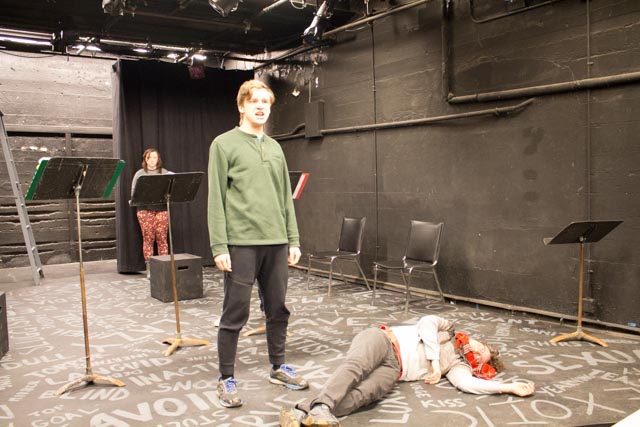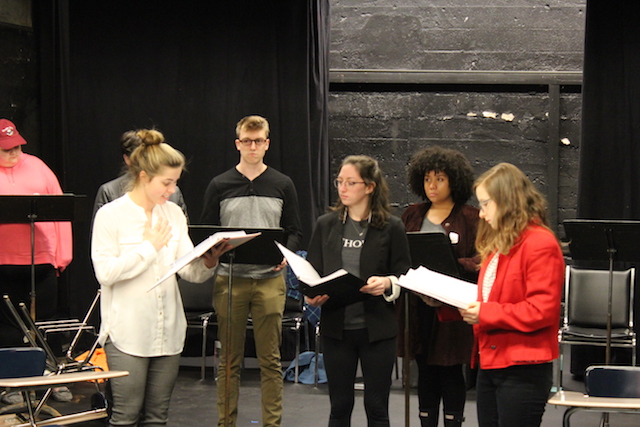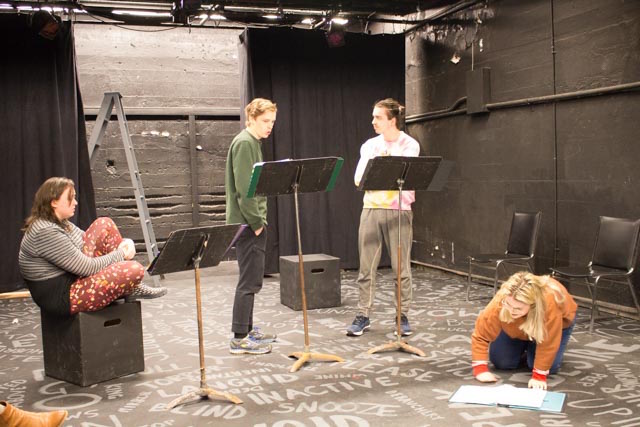
By Jada Butler
The first productions for the LIU Post Theater Company’s spring 2019 season are a part of the Building Bridges: The 2019 Virgil J. Lee New Play Festival. Post Theater Company will perform stage readings of the plays “Oak,” written by LIU Post alumnus Ryan Hudak (’12), and “This Can’t Happen Here,” written by LIU Post alumna Sarah E. Taylor (’15).
This is the first time these two plays will be publicly read. Most new works in their early stages will go through stage reading performances to give the playwright a sense of how the play could be performed. Two separate casts of LIU Post students prepared for the festival with only three weeks of rehearsals, which included many rewrites by the playwrights on set.
“Oaks” is the story of a family in power in a post-apocalyptic America, and what happens when the people of the town, tired of being ruled by fear, call for change. Family dynamics overlap with political discourse in the small town in the midst of a two year drought.
Jason Jacobs, a director from New York City, is directing “Oaks.” He described the play as a modern myth. “It’s a new play but it feels like it could be sort of an ancient tale,” he said. “It takes place in a futuristic America that is very much kind of like a past America — almost like a modern myth.”
“Oaks” takes place in a small town with a ruling family, the Oaks family. “They’re the muscle and power of the town,” Jacobs said.
Throughout the play, we watch Oak, played by William Pope, an LIU Post junior theater major, defend his position as head of the family and town leader, and maintain his power while figuring out how to fix a drought that may have been caused because of his family.
Oak’s sister, Penelope, played by Thea Kraus, junior musical theater major, is a seer, and returns to her hometown after 20 years to share a vision with her brother that could help save the town, but it comes at a cost.
“Oak comes to realize that it’s somehow on him and his family to fix it, but someone’s blood will have to be spilled,” Jacobs said.
All of this on top of a new government trying to take control of the town takes a toll on Oak. “The whole Oak family created this town, and once people try to take that away from them, and once they start trying to break apart the family, it starts to crumble the town and Oak personally,” Pope said.
The character dynamic is intense, and the actors must work hard to portray their characters’ depth since this performance will take the form of a stage reading rather than a traditional play.
“A stage reading is always a tricky thing,” Jacobs said, especially when the cast is given too much rehearsal time and a large stage to work with. The cast must fight the temptation to explore movement. “We walk a fine line to keep it as a reading, but give the audience a feeling of what it might look like if we had sets, costumes, props and objects. It’s a delicate process,” Jacobs said.
 What the stage reading lacks in movement, it makes up for in the delivery of the lines and the depth of the characters.
What the stage reading lacks in movement, it makes up for in the delivery of the lines and the depth of the characters.
“We spent a lot of time on the script. It’s important we really give the playwright’s words their full due,” Jacobs said. He also stressed the importance of the actors’ “actions” or intentions behind their delivery.
Pearl Emerson, a sophomore musical theater major, plays Oak’s mother, Judy. “She’s experiencing a lot of change in their little town. She is on her way out as the matriarch and a new government is being formed that she’s not so sure she is going to be a part of,” Pearl said. Judy’s uncertainty causes tension in the family.
Stephanie Jeker, stage manager and sophomore musical theater major, believes the audience will be satisfied with the play. “They are really going to get a sense of the story and the depth of the characters,” she said.
The second play, “This Can’t Happen Here,” takes on a form of social justice theater, revolving around gun violence and mass shootings, specifically school shootings. The playwright, Taylor, said her motivation for the story began after the Parkland school shooting, though she didn’t begin writing the play until late November 2018.
“I wanna explore how as a society we deal with these things,” Taylor said. She expressed how the media tends to “perpetuate the problem.” Many times throughout the play, reporters who cover the shootings portray various “faces” of the media: compassionate, exaggerated, offensive, and desensitized.
“This Can’t Happen Here” takes the unique perspective of the parent of the shooter. “(They) are vilified and ostracized — is it their fault, or is it not,” Taylor said. “Parents are always trying to do the best thing, so I wanted to explore that.”
This nine person cast is a strong ensemble piece, with many of the actors taking on multiple roles throughout the play.
Michaela Fox, an LIU Post junior musical theater major, plays Madge Redburn, a mother of two, a wife, a businesswoman, and the parent of gun violence victims. Madge works as the director of marketing and promotions for a gun manufacturing company in her town. She is in the best position to make real change after the shooting.
When a tragedy hits, Madge’s whole life flips upside down. “We watch Madge go through the motions of how the strong, independent woman suddenly is shattering from the inside out, and how it takes over every decision she makes,” Fox said.

Paul J. Bakey, senior musical theater major, plays Aaron Redburn, one of Madge’s sons. He is a victim of gun violence, and his death is what leads Madge to make change.
Though it is script-in-hand, the cast utilizes minimal blocking, lights, and vocal sound effects to bring the story to life.
“The issue with stage readings is sometimes the play is written to be performed full out. Sometimes it’s difficult to get that in a reading,” Bakey said. Some things are blocked out just to help the story along.
“With violence happening as often as it does, I think people often forget that these are real people,” Julia Rivera, a sophomore theater major who plays multiple roles, said. “I think we can get so desensitized by violence. It’s not always covered in the news. These are real people that are being affected, real people that are dying, and that needs to change,” she said.
Claire Main, senior theater major, is the assistant director for the show. She works with Luke Leonard, a director from New York City. “It’s been really fun working with Luke, because he’ll give me opportunities to speak my thoughts and add on to what he’s saying,” Main said. Leonard’s direction style, she said, is focused, but also very laid back and comfortable, which brings light to such a “dark” play.
Main wants the audience to realize the call for immediate action. “There’s a line that says, ‘my thoughts and prayers are with you,’ but in the situation of gun violence, thoughts and prayers aren’t enough. It’s about policy, it’s about change, it’s about taking action,” she said.
“I want audiences to think about that middle point, the gray areas” between anti-gun and pro-gun positions, Taylor said. “If we thought more about the gray, then we’d be closer to finding a solution, rather than being so black and white about it.”
The New Play Festival will be held at the Rifle Range Theater on the LIU Post campus in Brookville at 7:30 p.m. on Friday, Feb. 8 and Saturday, Feb. 9, and at 3 p.m. on Sunday, Feb. 10. Tickets, which are $15, or $12 for senior citizens and $10 for students with valid ID, can be purchased at the box office or at tix55.com.
This article was originally published in the Pioneer, the award-winning student newspaper of LIU Post, www.liupostpioneer.com, and is republished here by Blank Slate Media with the permission of the Pioneer.






